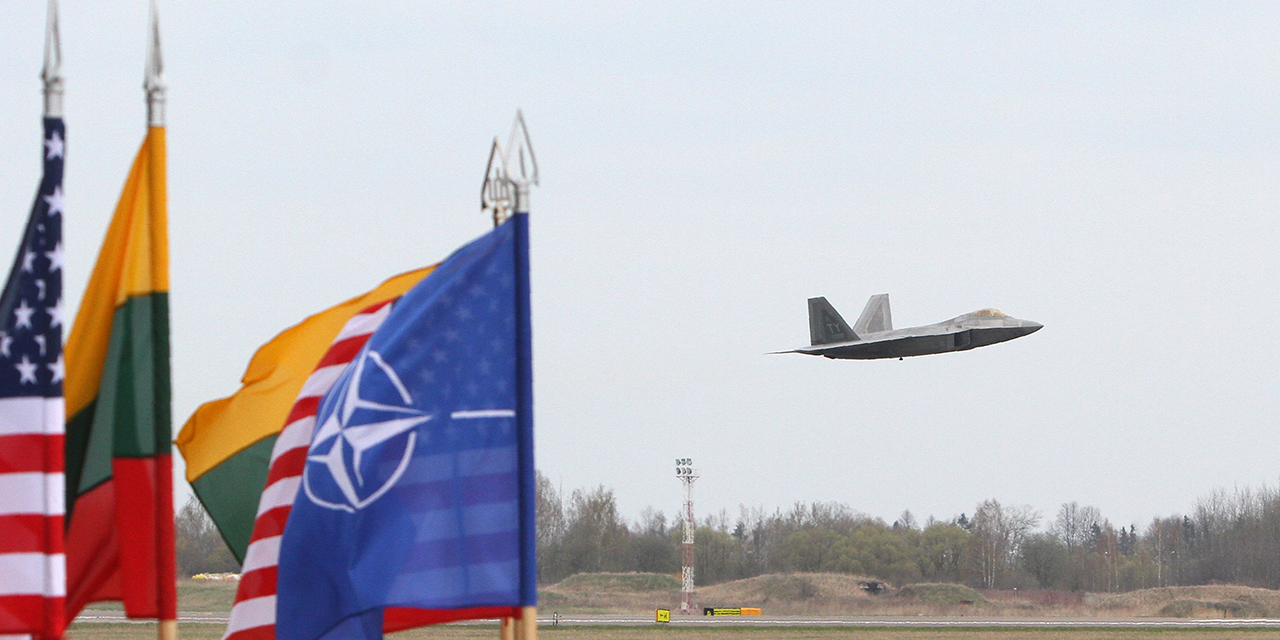
This analysis focuses on views of the North Atlantic Treaty Organization (NATO) among 16 member nations and three nonmember nations in Europe and North America. In all, the analysis covers over 90% of the population living in NATO countries.
Pew Research Center has been tracking views of NATO since 2007. This report also includes views of Article 5 obligations, which state that an attack on one NATO country is an attack on all; preferences for close relations with the U.S. versus with Russia; support for the use of military force to maintain order in the world; and agreement with the sentiment that parts of neighboring countries belong to another country.
For this report, we used data from a survey conducted across 19 countries from May 13 to Aug. 12, 2019, among 21,029 respondents. The surveys were conducted face-to-face in Central and Eastern Europe, Greece, Italy, Russia and Ukraine. Surveys were conducted over the phone in North America and Western Europe.
Here are the questions used for the report, along with responses, and its methodology.
NATO is generally seen in a positive light across publics within the alliance, despite lingering tensions between the leaders of individual member countries. A median of 53% across 16 member countries surveyed have a favorable view of the organization, with only 27% expressing a negative view. But opinions of NATO and related issues vary widely across the countries surveyed, especially regarding the obligations of Article 5 of the 70-year-old Washington Treaty, which declares that an attack against one member nation is considered an attack against all members.
Positive ratings of NATO among members range from a high of 82% in Poland to 21% in Turkey, with the United States and Germany in the middle at 52% and 57%, respectively. And in the three nonmember states surveyed, Sweden and Ukraine see the alliance positively (63% and 53%, respectively), but only 16% of Russians say the same.
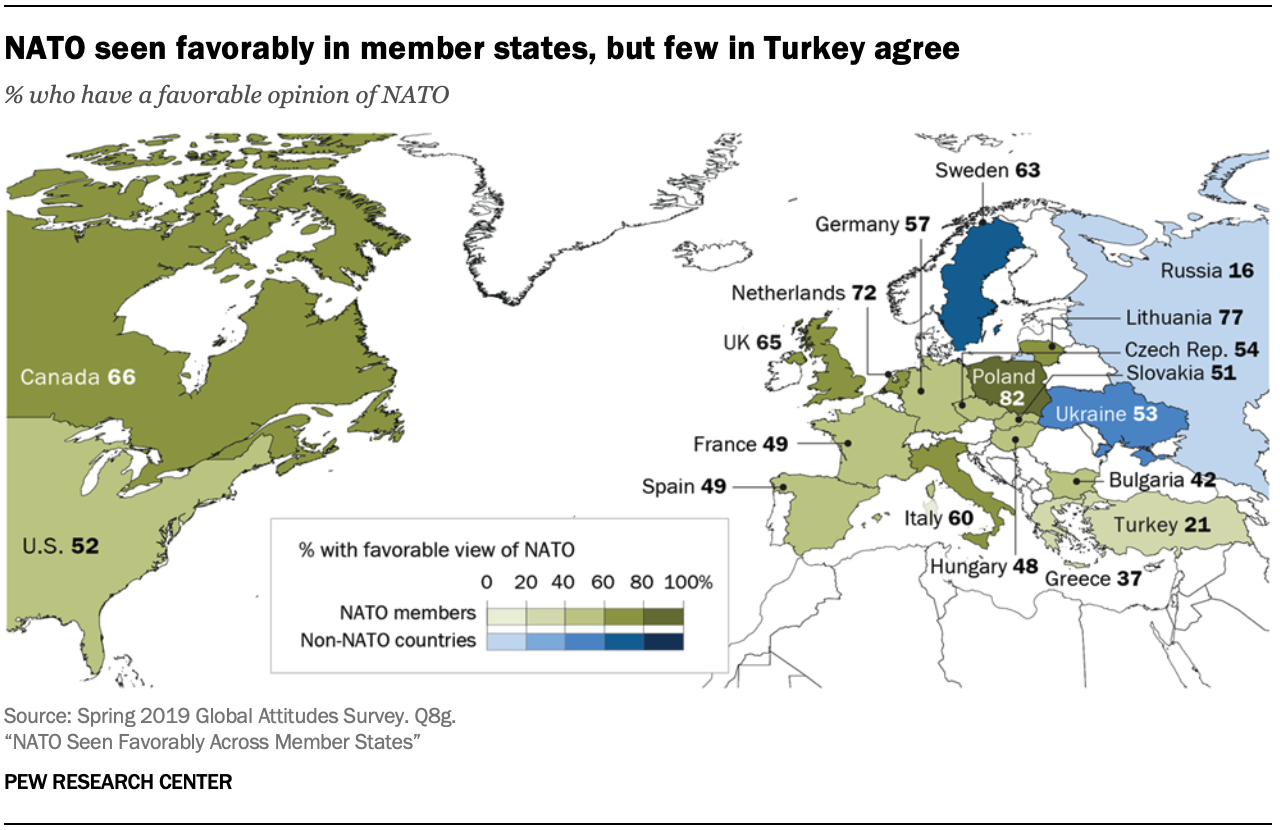
Favorable views of the organization have fluctuated over time among both NATO member and nonmember countries. Since the late 2000s, favorable opinions of NATO are up 10 percentage points or more in Ukraine, Lithuania and Poland. However, positive opinions of NATO are down significantly in Bulgaria, Russia, Germany and France over the past decade, with double-digit percentage point declines in each of these countries. Favorable views of the organization are also down significantly in Spain and the Czech Republic.
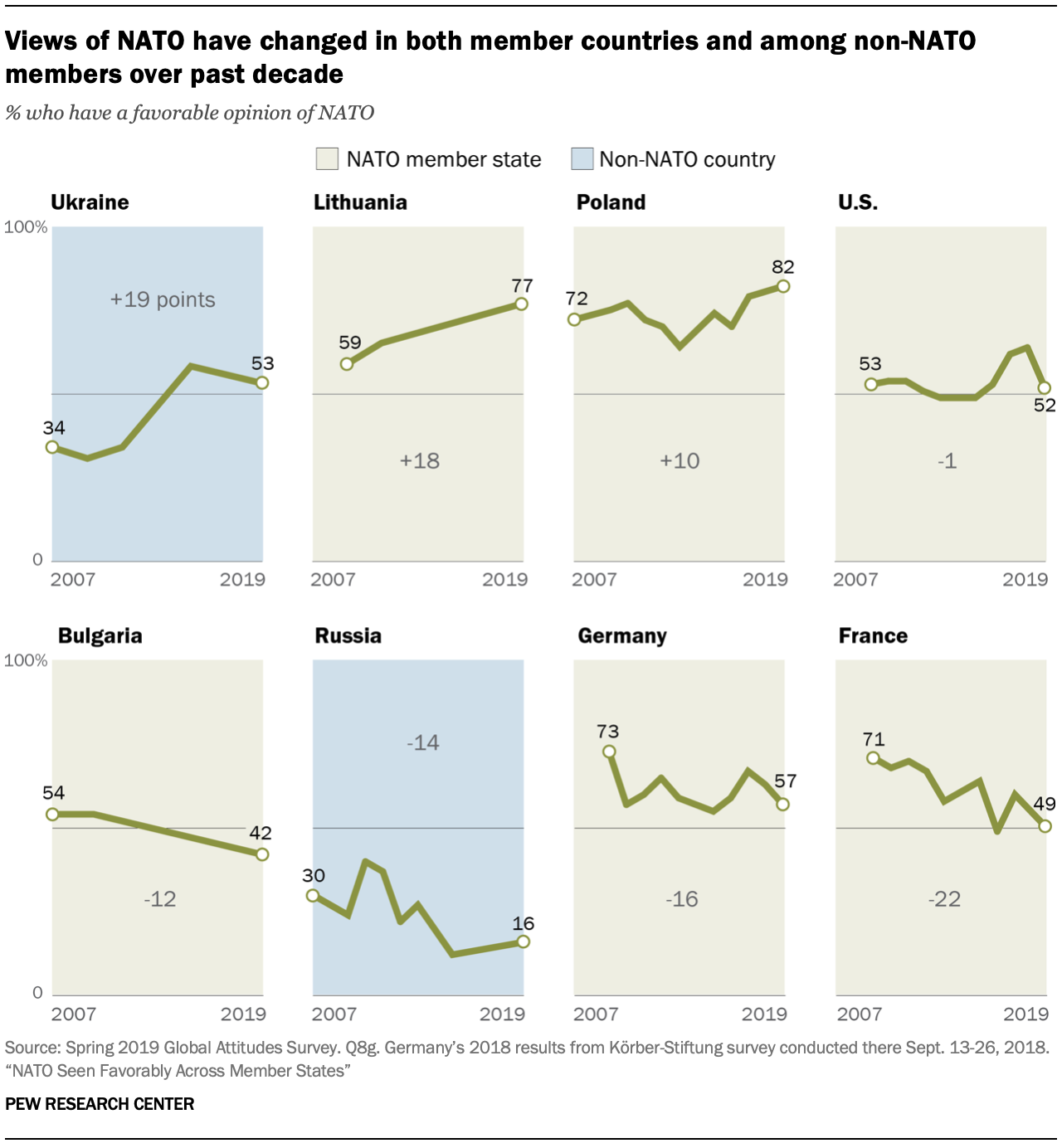
In addition, across several countries surveyed, favorable views of the organization are related to ideological orientation, with those on the right sharing a more positive view than those on the ideological left.
NATO serves as a political and military alliance for its 29 member states spanning Europe and North America. Founded in 1949 to provide collective defense against the Soviet Union, the alliance seeks to balance Russian power and influence, in addition to a host of other operations.
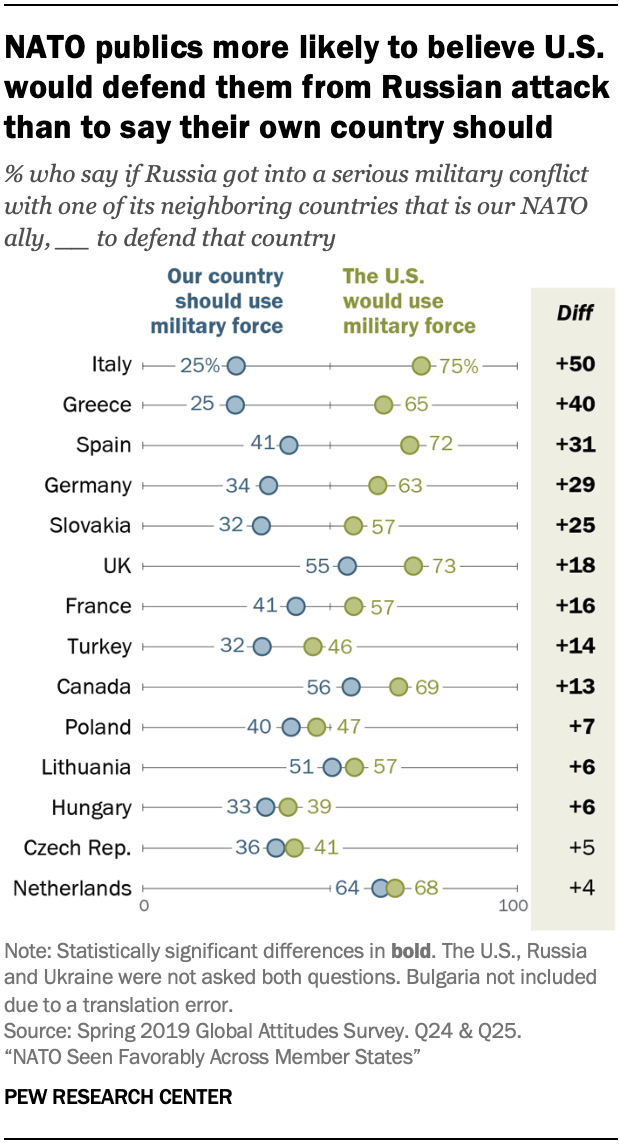
Despite the organization’s largely favorable ratings among member states, there is widespread reluctance to fulfill the collective defense commitment outlined in Article 5 of NATO’s founding treaty. When asked if their country should defend a fellow NATO ally against a potential attack from Russia, a median of 50% across 16 NATO member states say their country should not defend an ally, compared with 38% who say their country should defend an ally against a Russian attack.
Publics are more convinced that the U.S. would use military force to defend a NATO ally from Russia. A median of 60% say the U.S. would defend an ally against Russia, while just 29% say the U.S. would not do so. And in most NATO member countries surveyed, publics are more likely to say the U.S. would defend a NATO ally from a Russian attack than say their own country should do the same.
In terms of transatlantic relations, some Western European publics prefer a close relationship with the U.S., but many others prefer a close relationship with both the U.S. and Russia. Nevertheless, few want to prioritize their relationship with Russia over their U.S. relations. Ideology also relates to views of potential allies: Those on the right in several countries are more likely than those on the left to prefer a relationship with the U.S.
Despite the reservations many have about NATO’s Article 5 commitments, half or more in nearly every country surveyed agree it is sometimes necessary to use military force to maintain order in the world. In most countries surveyed, those who say military force is sometimes necessary are also more likely to agree that their country should use military force to defend a fellow NATO ally.
These views have changed significantly over the past decade in some countries. In Ukraine, Russia, Slovakia and Germany, more say military force is sometimes necessary than said the same in 2007. And in Italy, Spain and the Czech Republic, publics have grown less inclined to agree.
On the topic of territorial ambitions, when asked if there are parts of neighboring countries that really belong to their country, relatively few surveyed agree. However, among NATO member states, majorities in Hungary, Greece, Turkey and Bulgaria agree that parts of other countries belong to them. In many European countries, those with a favorable view of right-wing populist parties are more likely to support this statement.
These are among the key findings from a Pew Research Center survey of 19 countries, including 16 NATO member states, Sweden, Russia and Ukraine. The survey was conducted among 21,029 people from May 13 to Aug. 12, 2019. Throughout this report, German results are occasionally sourced from a series of surveys conducted in Germany by Körber-Stiftung, in partnership with Pew Research Center.
NATO viewed favorably across member states, though opinions have shifted over time
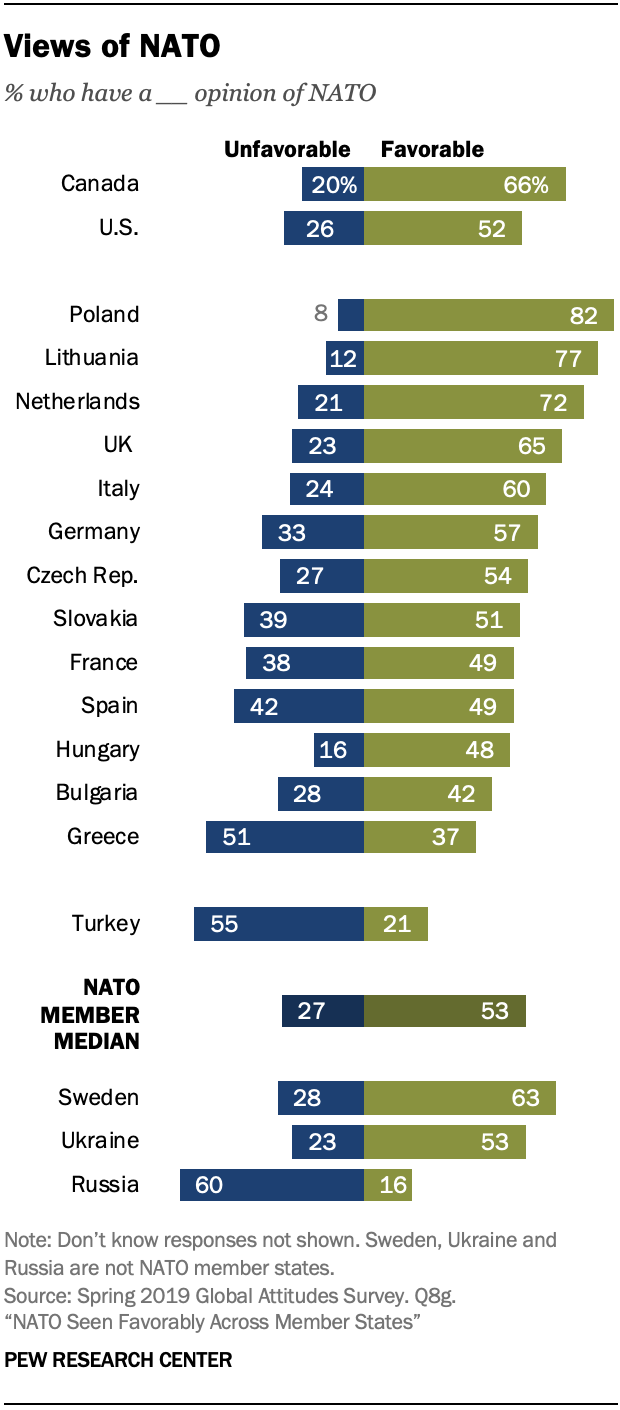
Across the 16 NATO member countries surveyed, NATO is generally seen in a positive light. A median of 53% across these countries have a favorable view of the organization, while a median of 27% have an unfavorable opinion. In 13 of these countries, roughly half or more have a positive view of NATO.
Among NATO member countries, positive views of the organization range from 82% in Poland to 21% in Turkey. Majorities of people in Poland, Lithuania, Netherlands, the United Kingdom, Italy and Germany rate NATO positively in Europe. Opinions are also relatively positive in the Czech Republic, Slovakia, France, Spain, Hungary and Bulgaria.
Canadians and Americans hold positive views of NATO, with 66% in Canada and 52% in the U.S. expressing favorable opinions.
In Turkey and Greece, publics are particularly unfavorable toward the alliance: Roughly half or more express a negative opinion.
Among the three non-NATO countries surveyed, views of the alliance are mixed. In Sweden and Ukraine, more than half have a favorable view of NATO. But in Russia, 60% have an unfavorable view of the organization, while just 16% view it favorably, the smallest share across all countries surveyed.
Views of NATO have fluctuated since Pew Research Center began asking this question in 2007. In non-NATO-member Ukraine, for example, 34% said they had a favorable view of the organization in 2007. In 2019, 53% said the same, an increase of 19 percentage points. Lithuanians and Poles have also grown more favorable toward NATO over the past 10 to 12 years (increases of 18 and 10 points, respectively).
Several countries have soured on the alliance over that period. In France, favorable views of NATO dropped from 71% in 2009 to 49% in 2019, a decrease of 22 percentage points. In Germany, favorable views of the organization declined by 16 points, and in Bulgaria favorable views are down by 12 points. In nonmember Russia, positive views have been nearly cut in half: In 2007, 30% had a favorable view of NATO. By 2019, just 16% expressed the same sentiment.
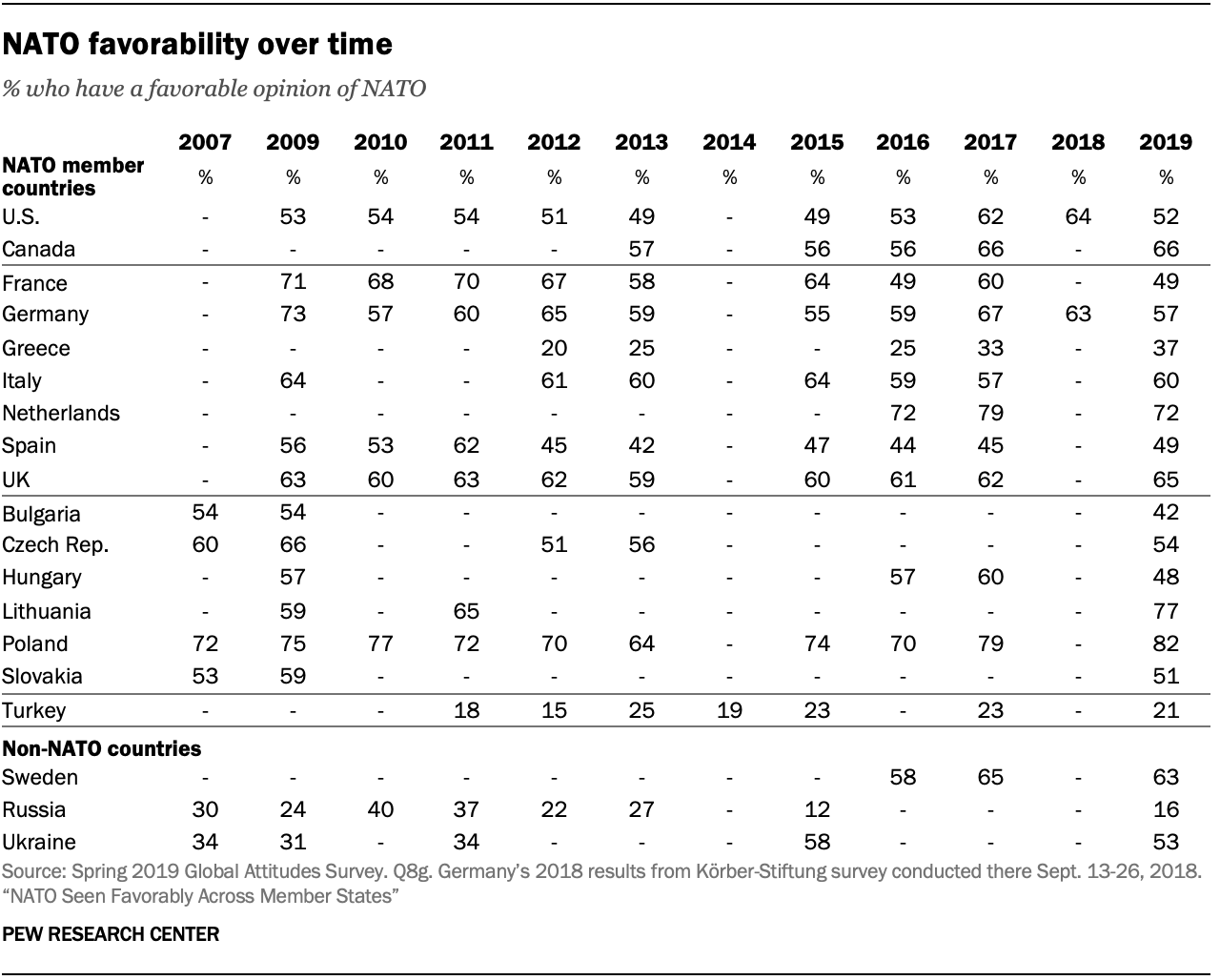
In U.S., views of NATO differ among Democrats and Republicans
Americans’ views of NATO differ by political party affiliation. Democrats and Democratic-leaning independents have been more likely to have a favorable opinion of NATO than Republicans and Republican-leaning independents across most years. That remained true in 2019, as 61% of Democrats had a positive view of the alliance, compared with 45% of Republicans.
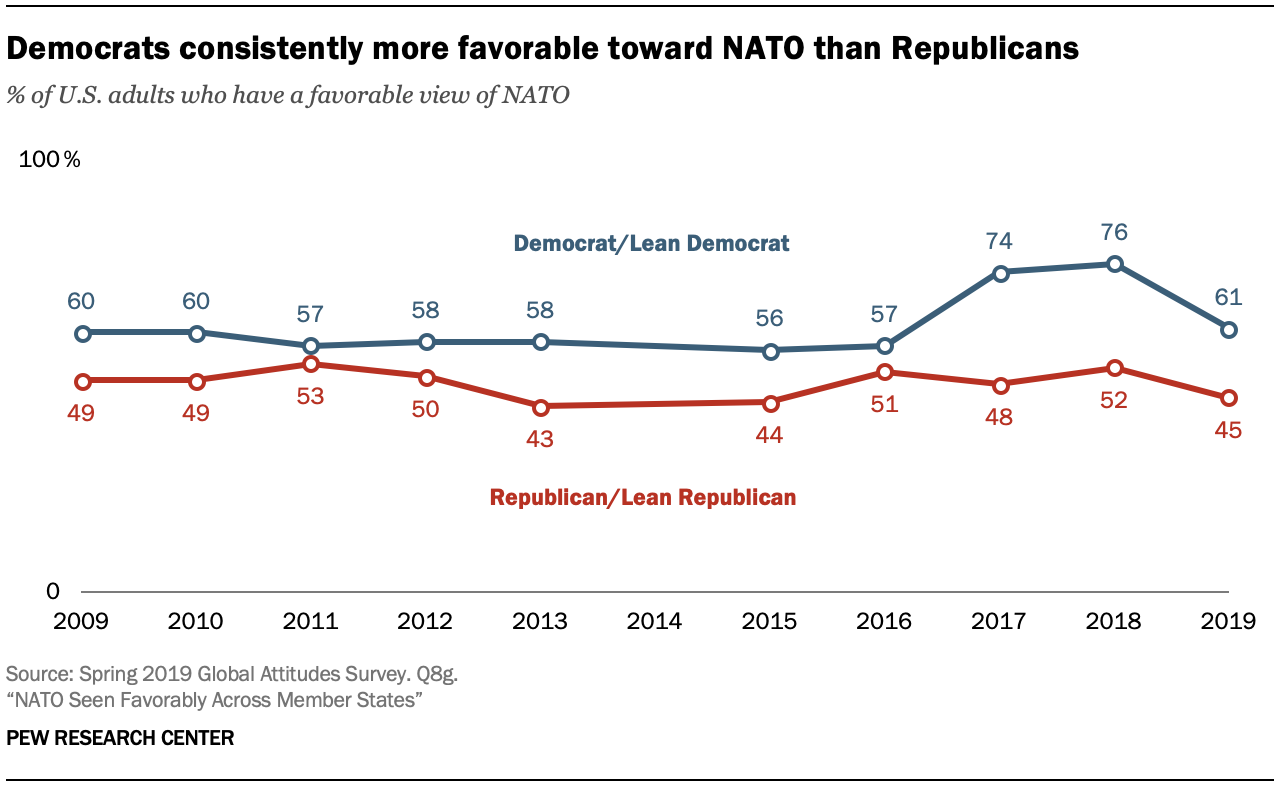
Both Democratic and Republican views of NATO remained generally stable until 2017, when Democrats grew much more likely to support NATO than their counterparts, a difference that has not changed significantly since. In 2017, 74% of Democrats and 48% of Republicans had a favorable opinion of the alliance, a difference of 26 percentage points. Since 2018, U.S. views of NATO have declined among supporters of both parties. Positive views among Democrats fell 15 points, while views among Republicans dropped 7 points.
Those on the right tend to have a more positive view of NATO
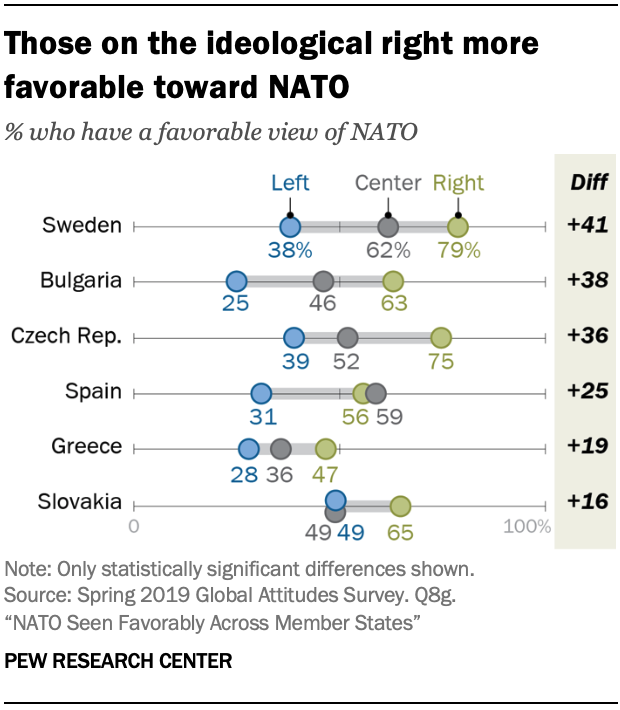
Ideology is a factor when it comes to views of NATO in several countries. In six countries, those placing themselves on the right side of the ideological spectrum are more favorable toward NATO than those on the left. In Sweden, for example, 79% of those on the ideological right have a positive opinion of NATO, compared with 38% of those on the left, a difference of 41 percentage points. Significant differences between those on the right and the left are also seen in Bulgaria (38 percentage points), the Czech Republic (36 points), Spain (25), Greece (19) and Slovakia (16).
Public reluctance on Article 5 obligations across NATO member countries
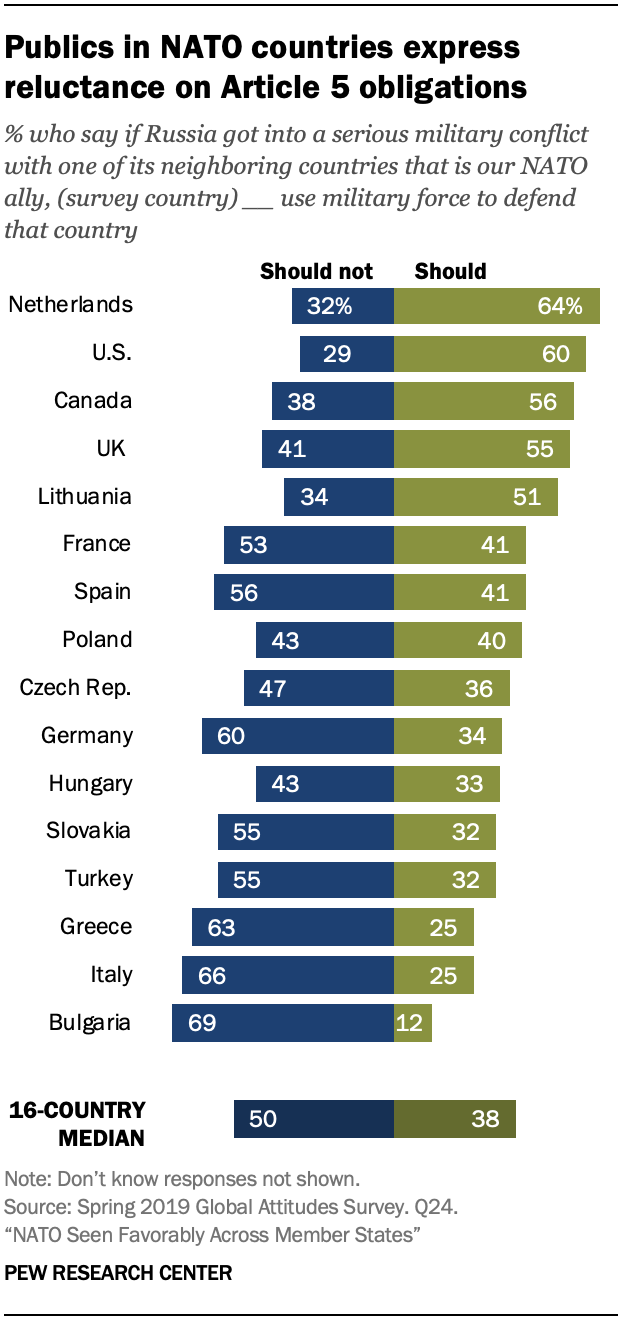
Article 5 of the NATO treaty is “at the very heart of NATO’s founding treaty,” according to the organization. The article states that “an attack against one Ally is considered as an attack against all Allies.”
When asked whether their country should or should not use military force to defend a NATO ally from a hypothetical attack by Russia, in only five of the 16 member states surveyed – the Netherlands, the U.S., Canada, the UK and Lithuania – do half or more say that they should use such force. Across the 16 countries, a median of 50% say that their country should not defend a NATO ally in the event of an attack by Russia, while 38% say they should.
Larger shares in 10 NATO member countries surveyed say their country should not use force to defend a NATO ally should there be an attack by Russia. This includes majorities in Bulgaria, Italy, Greece, Germany and Spain. In Poland, sentiment is divided.
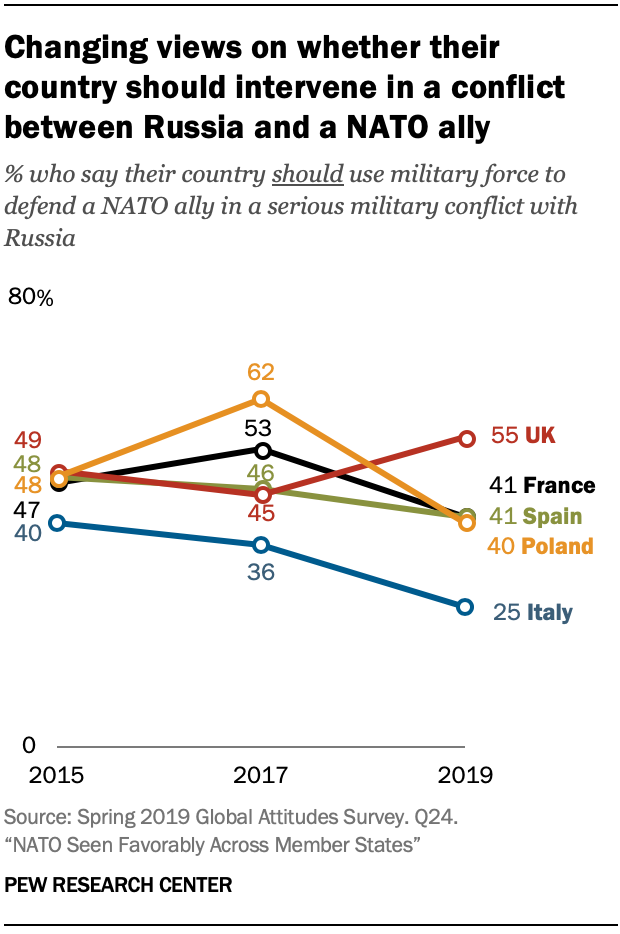
The belief that their country should respond to a hypothetical Russian attack on a NATO ally has become less common over time in a handful of countries. For example, in Italy, only a quarter in 2019 say that their country should defend a NATO ally, down from four-in-ten in 2015. Similar declines over this time period occurred in Poland (-8 percentage points), Spain (-7) and France (-6). However, support for protecting a fellow NATO nation has increased in the UK since 2015 (+6).
In eight of the countries polled, men are significantly more likely than women to say that their country should defend a NATO ally. For example, in Germany, 43% of men say that in the case of a Russian attack on a fellow NATO member their country should respond with force, compared with only a quarter of women. Similar double-digit differences occur in Spain, Hungary, the Czech Republic, the Netherlands and Poland.
Ideology also plays a role in people’s views about coming to an ally’s aid. In six countries, those who place themselves on the right end of the ideological spectrum are more willing to say they should defend a NATO ally than those on the right. This includes double-digit differences between right and left in all six countries: Spain (30 percentage points), the Czech Republic and Slovakia (21 points), Greece (14), and the UK and Italy (both 13 points).
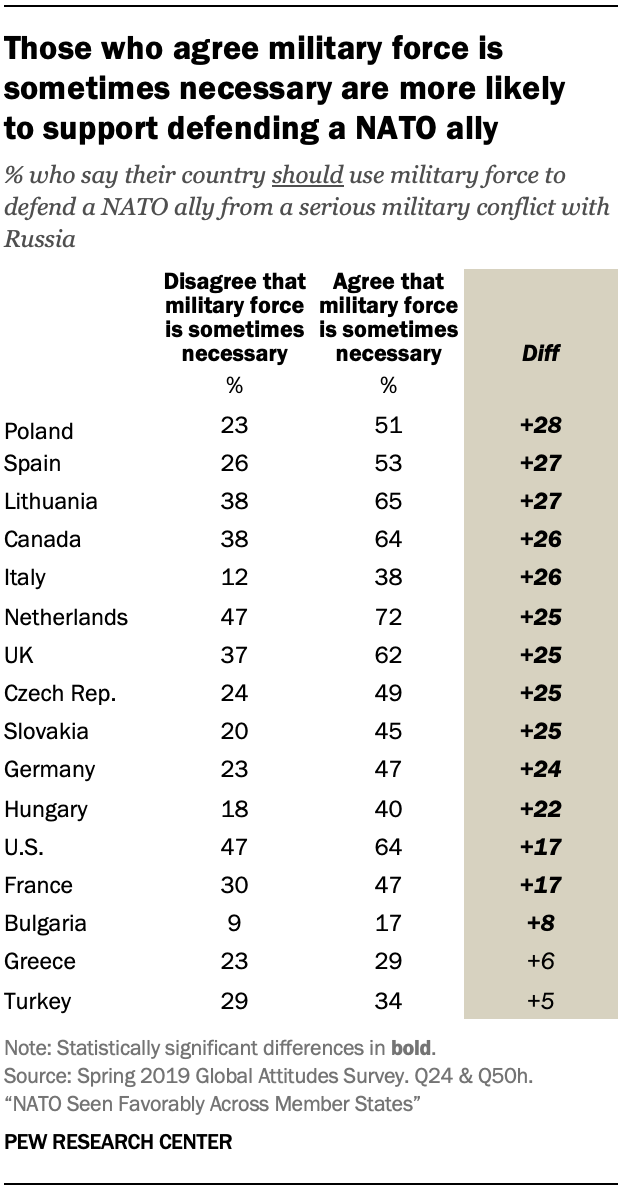
Views on defending an ally from a potential Russian attack are related to general attitudes toward the use of military force. Across most of the NATO member countries surveyed, those who agree that military force is sometimes necessary to maintain order in the world are more likely to say that they would defend a fellow NATO member from an armed incursion than those who disagree that a military solution is the best choice for keeping order. For example, in Spain, 53% of those who agree that military force is sometimes necessary say they would come to the aid of a NATO ally, versus only 26% of those who disagree with the principle of military force – a 27 percentage point difference.

In contrast to skeptical opinions on whether their own country should come to the defense of a NATO ally, people are much more likely to think the U.S. would take military action in response to a Russian attack.
A median of 60% across the member countries say the U.S. would use military force to defend a NATO country that was subject to a Russian incursion. Only 29% across these countries believe the U.S. would not defend the country that was attacked.
Roughly two-thirds or more in Italy, the UK, Spain, Canada, the Netherlands and Greece say the U.S. would defend a NATO ally. Majorities in Germany, Slovakia, Lithuania and France agree.
Poles, on balance, say the U.S. would help out should Russia use military force against a neighboring NATO country, but sentiment is more divided in Turkey, the Czech Republic and Hungary.
Since 2015, there has been some change in a few countries on this question. The belief that the U.S. would defend a NATO ally is down 8 percentage points in France but up 7 points in the UK and Spain. These sentiments are also up 6 points in Turkey.
In Hungary, views that the U.S. would help out in the event of a Russia attack are down significantly since 2017, falling 16 percentage points.
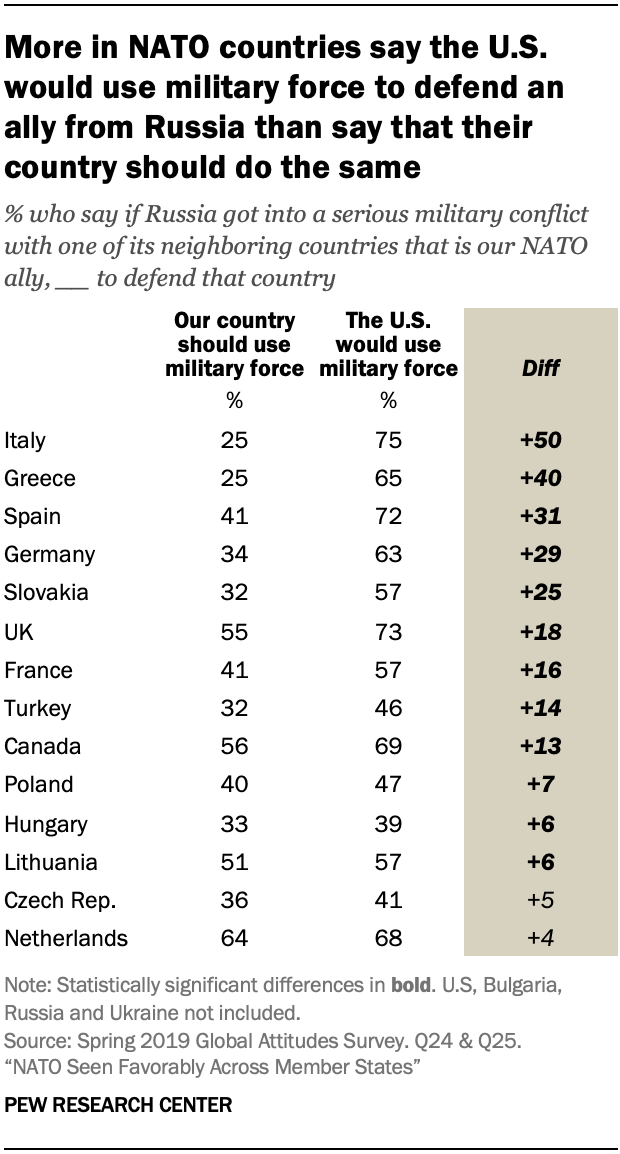
Young adults in Spain, France, Slovakia, Canada and Germany are more likely to believe the U.S. would defend a NATO ally against a Russian attack. For example, in Spain, 84% of 18- to 29-year-olds say the U.S. would uphold their Article 5 obligations, compared with 68% of those 50 and older.
In almost every country surveyed, people are significantly more likely to say the U.S. would defend an ally from a Russia attack than say their own country should take such action.
The biggest difference measured is in Italy, where three-quarters say the U.S. would use such military force in such a scenario, compared with only a quarter who say Italy should defend that NATO ally, a 50 percentage point difference. Similar differences are seen in Greece (40 points), Spain (31), Germany (29), Slovakia (25), the UK (18), France (16), Turkey (14) and Canada (13).
Many NATO countries in Europe value a close relationship with both the U.S. and Russia
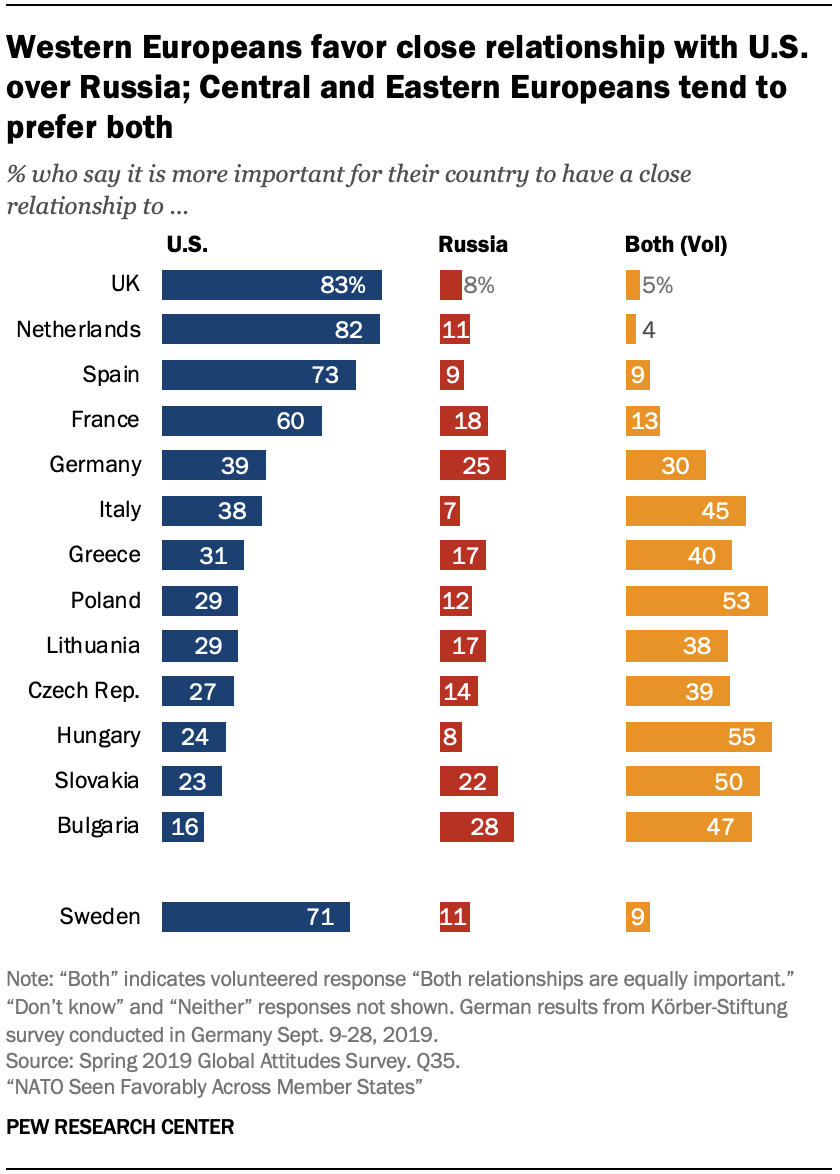
In nearly every country surveyed, larger shares support close ties with the U.S. than with Russia, with the exceptions of Bulgaria and Slovakia. And in many countries polled, publics tend to volunteer that a close relationship with both the U.S. and Russia is important.
Particularly in Western Europe, the share of the public that says a relationship with the U.S. is more important is substantial. For example, in the UK and the Netherlands, about eight-in-ten support ties with the U.S. over Russia or both. And in Sweden, a non-NATO state, 71% support closer ties with the U.S. than with Russia (11%) or both countries (9%).
Choosing a close relationship with Russia over the U.S. is considerably less widespread across the countries surveyed. Bulgarians are the most prone to this point of view, but just 28% say a close relationship with Russia is more important for their country. A quarter of Germans say it is important for their country to have a close relationship with Russia, compared with 39% who favor a close relationship with the U.S. Three-in-ten Germans volunteer that a close relationship with both countries would be preferable.
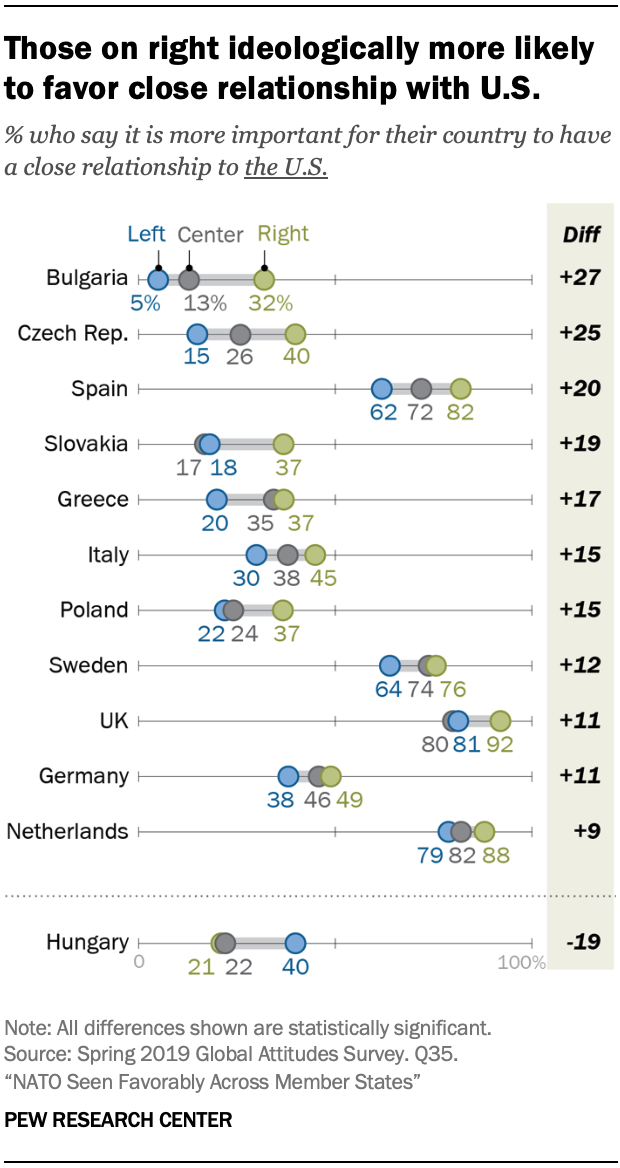
Central and Eastern European publics tend to volunteer their preference for a close relationship with both the U.S. and Russia. In Hungary, Poland, Slovakia and Bulgaria, roughly half or more say a relationship with both countries is important. And in Italy, Greece, the Czech Republic and Lithuania, about four-in-ten or more say the same.
Ideology is linked to views of closer relations with the U.S. In 11 of 14 countries, those on the ideological right are more likely to support a close relationship with the U.S. than those on the left. In the Czech Republic, for example, 40% of those on the right say a close relationship with the U.S. is more important, compared to 15% of those on the left, a difference of 25 percentage points.
Hungary is an exception. Hungarians on the left (40%) are almost twice as likely as their counterparts on the right (21%) to support close U.S. relations.
Most NATO and non-NATO countries believe military force is sometimes necessary
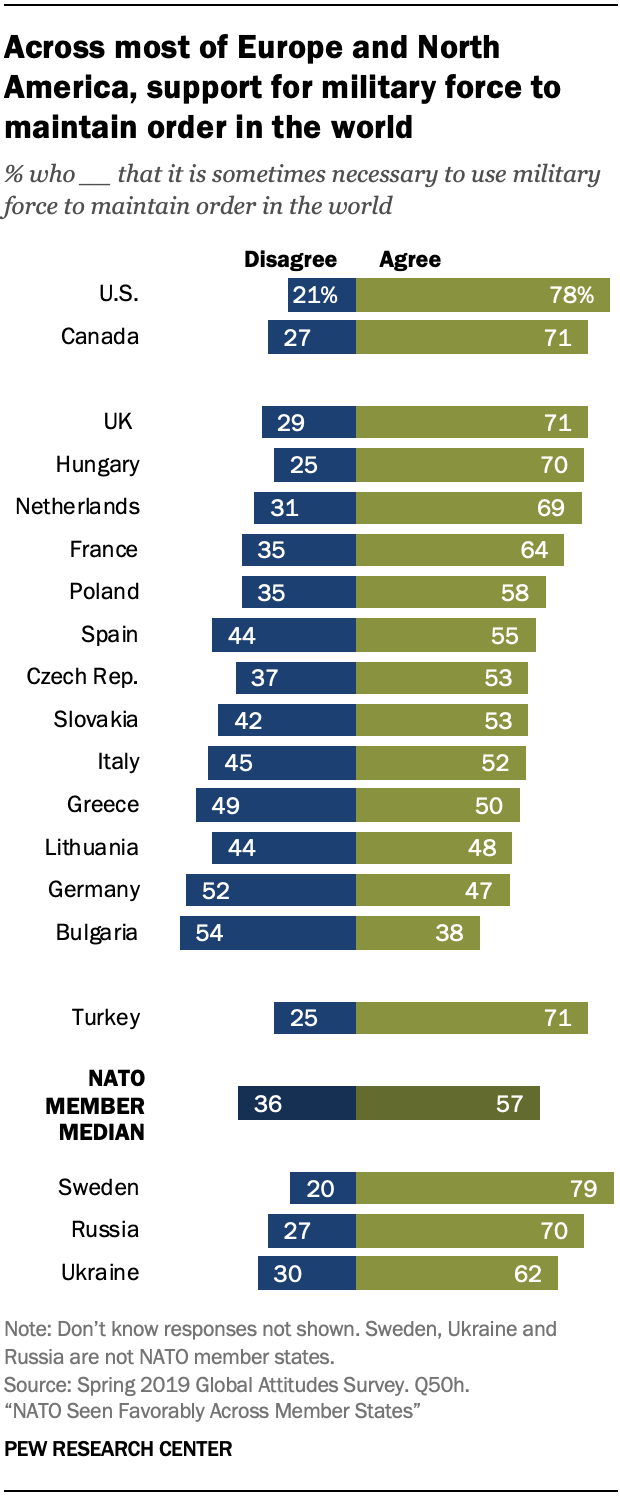
There is widespread support across most of the NATO countries surveyed for the use of military force to maintain order in the world. A median of 57% across 16 member countries agree that military force is sometimes necessary, while a median of 36% disagree.
Across most countries surveyed – both members of NATO and those that do not belong to the organization – about half or more support the use of military force to maintain order. And in seven countries (Sweden, the U.S., Canada, the UK, Turkey, Russia and Hungary) seven-in-ten or more hold this view.
Germans are more divided, with 47% saying that military force is sometimes necessary and a similar 52% disagreeing with that statement. In Bulgaria, only 38% say military force is sometimes necessary.
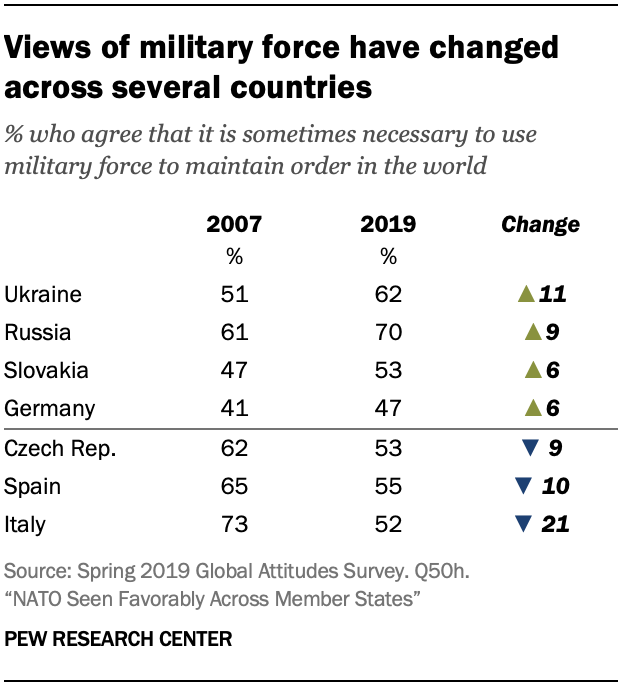
Support for military force has changed since Pew Research Center asked this question in 2007.
For example, in both Ukraine and Russia, two countries engaged in conflict since 2014, publics increasingly say military force is sometimes necessary (by 11 and 9 percentage points, respectively). This opinion has also become more common in Slovakia and Germany.
Yet in several European countries, support for military force has waned. This is the case in Italy (a decrease of 21 percentage points), Spain (10 points) and the Czech Republic (9).
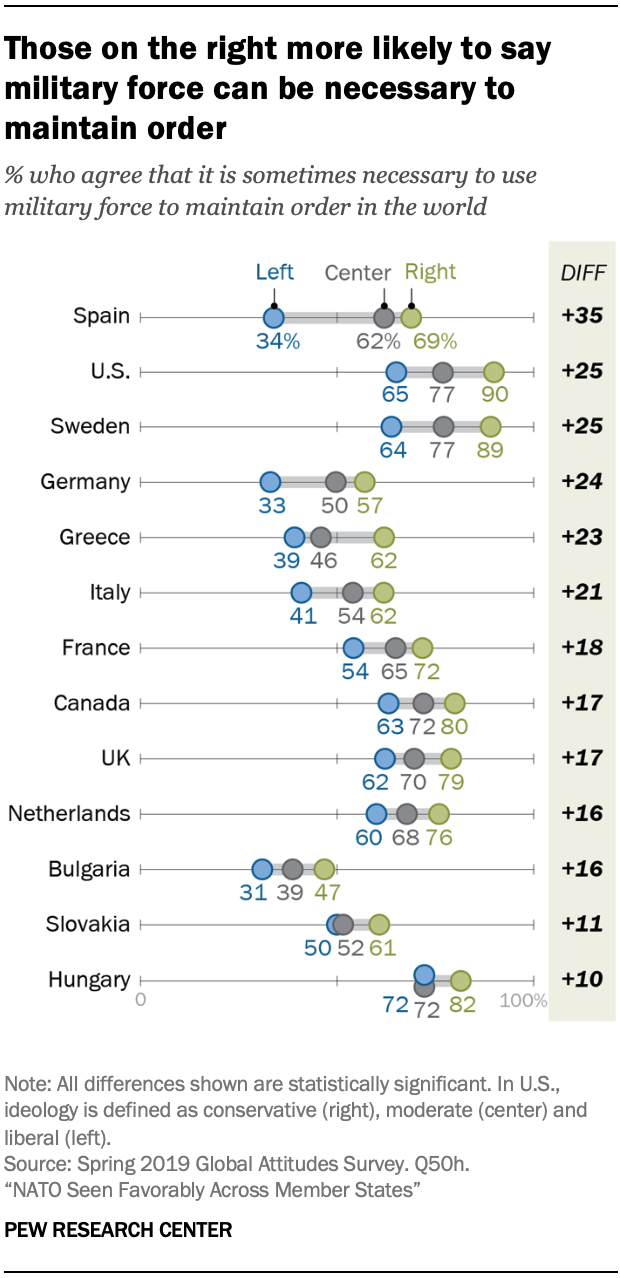
In 12 countries, people on the right of the ideological spectrum are more apt than those on the left to agree that military force can be justified. In Spain, for example, those on the right are about twice as likely to support military force as their counterparts on the left.
In the U.S., conservatives are 25 percentage points more likely than liberals to say military force is sometimes needed. Similarly, 91% of Republicans and Republican-leaning independents say military force is sometimes necessary, while 71% of Democrats and Democratic-leaning independents agree.
Gender also shapes views of military action. Across most of the NATO and non-NATO countries surveyed, men are more likely than women believe in the need for military force. In the Czech Republic, for example, 63% of men say military force is sometimes necessary, compared with 45% of women. And in Ukraine, 71% of men support military force, versus 56% of women. Double-digit gender differences are also present in Germany (14 points), Poland (12), Bulgaria (12), Hungary (11), Italy (11) and Spain (10).
Are there parts of neighboring countries that really belong to us?
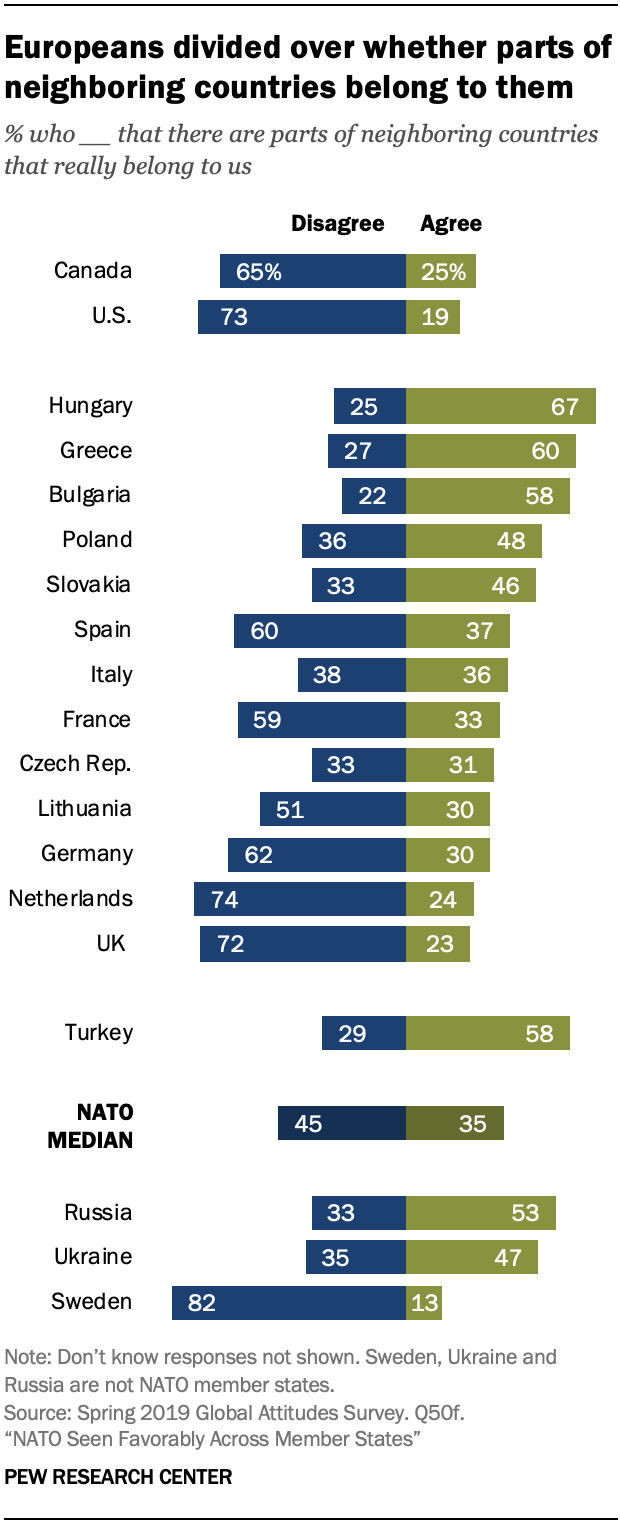
Across NATO and non-NATO countries, there is disagreement over whether parts of neighboring countries really belong to them. A median of 45% across the 16 NATO countries surveyed disagree, while a median of 35% agree (in several countries, the share who did not express an opinion is relatively high).
The shares who agree with this statement are highest in Central and Eastern European countries surveyed. About two-thirds of Hungarians (67%) agree that parts of neighboring countries belong to them, including 40% who completely agree. In Turkey, 58% agree that parts of nearby countries belong to them. And in neighboring Greece, 60% say the same.
In Western European countries, sentiments tend to run in the opposite direction. In Sweden (82%), the Netherlands (74%), the UK (72%), Germany (62%), Spain (60%) and France (59%), majorities disagree that there are parts of other countries that belong to them.
In both the U.S. and Canada, publics overwhelmingly disagree that parts of other countries belong to them (73% and 65%, respectively). However, a quarter of Canadians and roughly one-in-five Americans say the opposite and agree that there are parts of neighboring countries that belong to them.
Russians and Ukrainians tend to agree that parts of neighboring countries belong to them (53% and 47%, respectively).
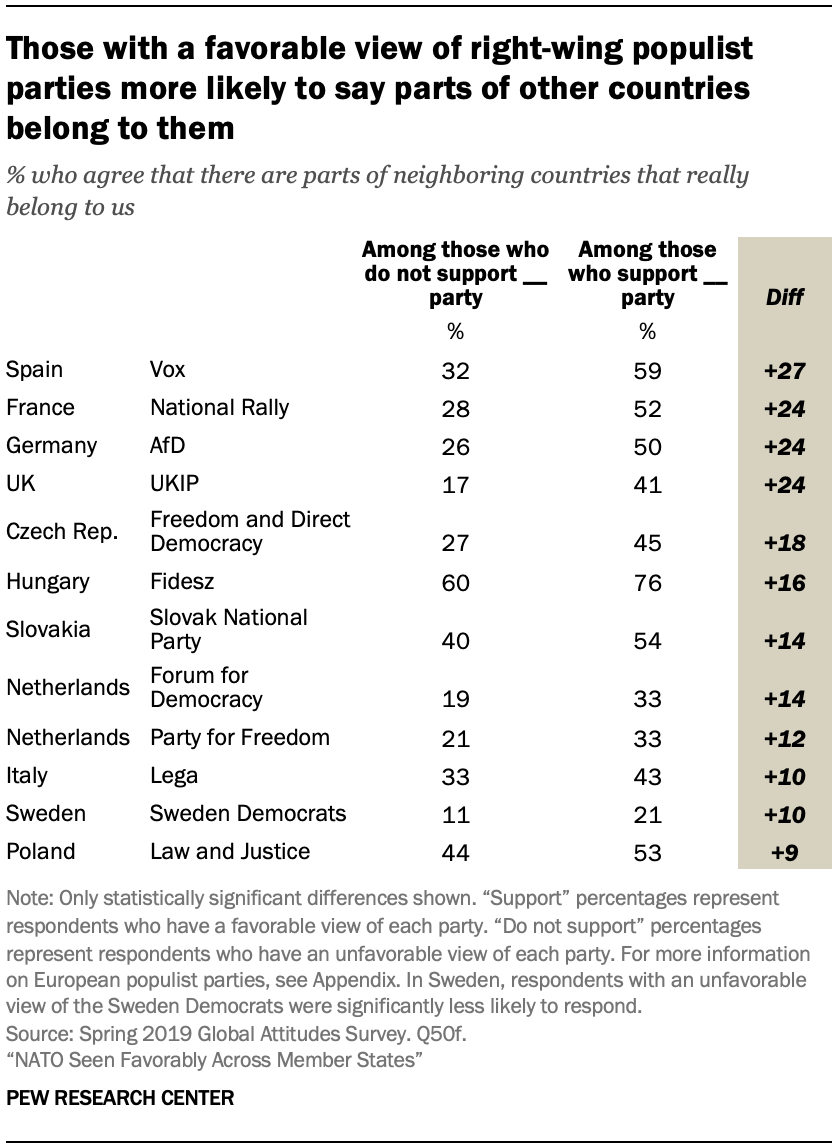
In Europe, supporters of right-wing populist parties tend to be more likely to say parts of neighboring countries belong to their country. Supporters of right-wing populist parties are more likely to agree with this statement for nearly every European right-wing populist party included in the survey. In Spain, for example, those who have a favorable view of Vox are 27 percentage points more likely to say parts of another country belong to Spain than those who do not have a favorable view of the party.
Correction (February 12, 2020): This post has been updated with the proper characterization of NATO’s founding treaty and revised a significant difference in Lithuania. The changes due to these adjustments do not materially change the analysis of the report.




